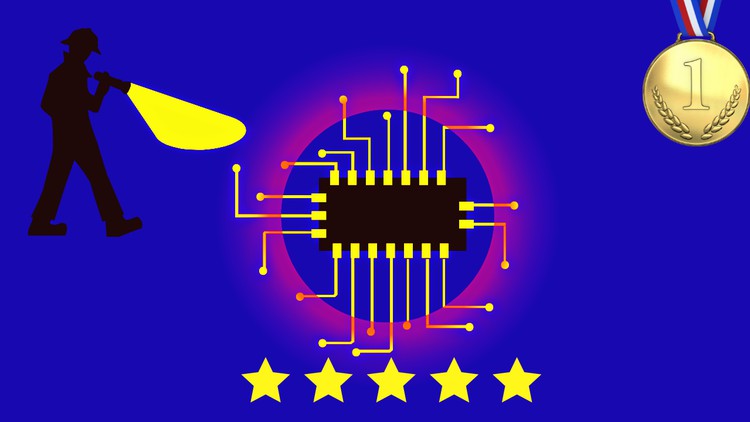Become Digital Electronics Master
- Description
- Curriculum
- FAQ
- Reviews
Welcome to Computer Engineering && Electronics (Digital electronics course)
This Course is centric to Digital world., how it progressed at tremendous rate the size of computers which was a house itself., fits into your palm.
The progress of Digital electronics is important to learn because this is the platform for all the software development, codes & algorithms. The instructions given to the machine is actually processed by CPU/GPU the way it happen and ultimately gives us the results are only by digital electronics hardware and logic that actually make our performers (codes) be so fast and efficient..
A lousy machine cant take so much of instructions at a given time but its possible today to handle millions of instructions within seconds and that is because of the developments in digital electronics. The journey started from vaccum tubes to transistors and now powerful IC’s. We’re living in the world of IOT (Internet Of Things) Our devices/instruments/machines works on instructions of softwares (fan, bulb, communication, lights, car’s, camera and security etc..)
The knowledge of Digital electronics help us to build a solid foundation in fastest growing technology and most-most centric to human lifestyle.
This course will take you to from the point of the begining and take you through all walks of the development and will land you the the state where you start understanding the machines, powers, signals and Integrated Circuits (IC’s)
This will give you a clear understanding of the
“MATHS ~ TECHNOLOGY ~ SCIENCE“
of the Digital electronics., from the point of what’s happening inside to the logic which and why’s of it, where to use it & how to program it and finally see it working or dancing on the instruction sets you feed into your machine.
We’re gonna learn:
1.SemiConductors
2.Logic (Boolean Algebra)
3. Machines/Instruments
4. Electrical Technologies
5. Digital Logic & Design (memory/flipflops)
6. Computer Organization & Architecture
7. Advanced Computer & Architecture
8. Digital & Analogue Communication
9. Microprocessor’s (IC’s)
10. 8086 Architecture
“Starting from very basics of semiconductors introduction to the point where you start understanding and learning about Integrated circuits is actually a full journey in its own”
You will be completely different before and after!
Covering all Semesters Of engineering Digital electronics!
This course focuses on extensively on Computer Organization and Advanced Computer Architecture here we learn about CPU’s, Assemebly language, RAM, ROM, Cache memory etc.. This will gonna build a solid foundation on the subject and helps to understand the computer system and computer technology.
In latter section the focus gets shift in teaching Microprocessors and give a foundational knowledge about this exciting subject. 8086 Architeture and its comparision with 8085.
This course is focused and made by keeping in mind that you’re starting as complete beginner thats why the emphasis of each section is to cover all the basics and along with that section wise notes and short quiz at the end of each section is provided so that you can check your progress and can revise at each level (section) and then only proceed to the next level.
Any doubts in anywhere can be asked in QnA community (your mate learner’s) & me(your instructor) are more then happy to be the part of your journey and to help you along the way. This will make this digital electronics course more interactive and alive. I will add answers from my side on regular intervals to help you along the way of learning.
I think “This is the great starting point for your digital electronics” career to take of even if you’re enthusiast this will make your basics solid & you will start understanding what’s actually happening inside the devices you see everyday!
Happy learning to you & i wish you the great future ahead!
-
1What is semiconductorVideo lesson
-
2Types of semiconductorVideo lesson
-
3Band gapVideo lesson
-
4Electron jump (Fermi level)Video lesson
-
5Depletion regionVideo lesson
-
6Reality of holesVideo lesson
-
7Junction devicesVideo lesson
-
8DiodeVideo lesson
-
9Zener diodeVideo lesson
-
10Coming up next (in applications)Video lesson
-
11BiasesVideo lesson
-
12Why "N" are on the top? And Logic gatesVideo lesson
-
13Photo cell Vs Solar cellVideo lesson
-
14AND GateVideo lesson
-
15OR Gate & Not Gate logicVideo lesson
-
16NotesText lesson
Hi., your learning journey is going awesome and here are short revision handy notes (handwritten by me your instructor, just for you)
It will help you revise this entire section in a look!
-
17Test your skillsQuiz
-
18Introduction with Binary languageVideo lesson
-
19Number systemsVideo lesson
-
20ConversionsVideo lesson
-
21Fraction & Decimal to BinaryVideo lesson
-
22Practice with fraction and it's binary convertionVideo lesson
-
23Octa and Hexa into DecimalVideo lesson
-
24Binary to Octa and Hexa..Video lesson
-
25Binary arithmeticsVideo lesson
-
26ComplementVideo lesson
-
27Weighted BinaryVideo lesson
-
28Non Weighted BinaryVideo lesson
-
29Postulates of Binary AlgebraVideo lesson
-
30Boolean Operator'sVideo lesson
-
31Karnaugh map introductionVideo lesson
-
32Karnaugh map (simplification)Video lesson
-
33Don't Care ConditionVideo lesson
-
34Karnaugh map (Practice Questions) & SOP & POS forms.Video lesson
-
35Prime implicantsVideo lesson
-
36Test your skillsQuiz
-
37IntroductionVideo lesson
-
38GalvanometerVideo lesson
-
39VoltmeterVideo lesson
-
40AmmeterVideo lesson
-
41Watt meter (Energy meter)Video lesson
-
42Voltage regulatorsVideo lesson
-
43Linear Voltage regulatorsVideo lesson
-
44InverterVideo lesson
-
45SMPSVideo lesson
-
46UPSVideo lesson
-
47CROVideo lesson
-
48Test your skillsQuiz
-
55IntroductionVideo lesson
-
56Logic GatesVideo lesson
-
57Substituting One logic Gate to anotherVideo lesson
-
58Half adderVideo lesson
-
59Full addersVideo lesson
-
60Subtractor (half & full)Video lesson
-
61DecoderVideo lesson
-
62Designing decoderVideo lesson
-
63MultiplexVideo lesson
-
64Multiplex continue..Video lesson
-
65DemultiplexVideo lesson
-
66EncoderVideo lesson
-
67Sequential circuitsVideo lesson
-
68FlipFlopsVideo lesson
-
69FlipFlops cont..Video lesson
-
70FlipFlops final lessonVideo lesson
-
71CountersVideo lesson
-
72Test your skillsQuiz

External Links May Contain Affiliate Links read more





